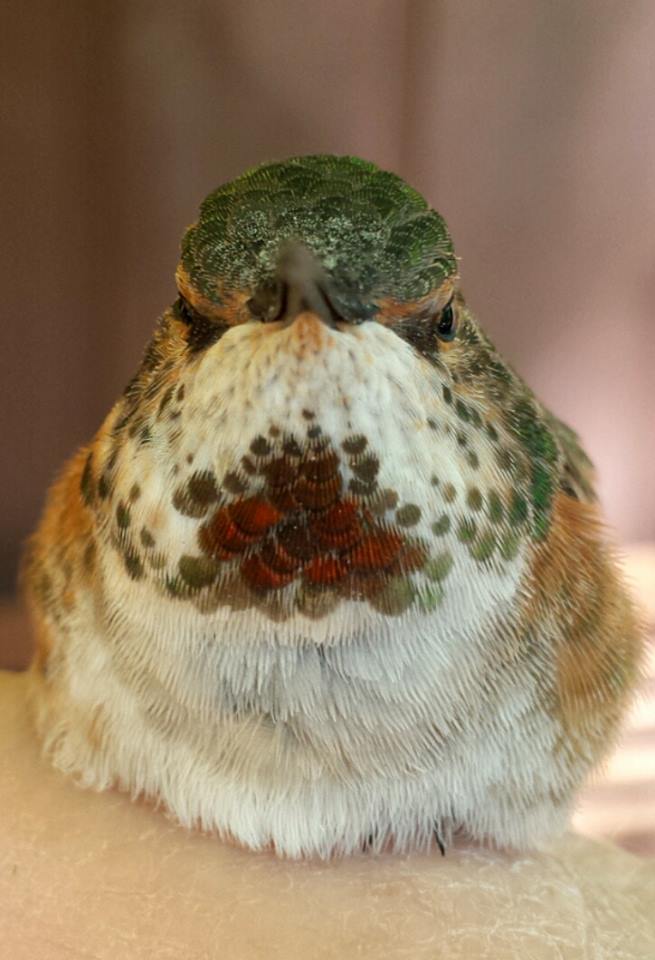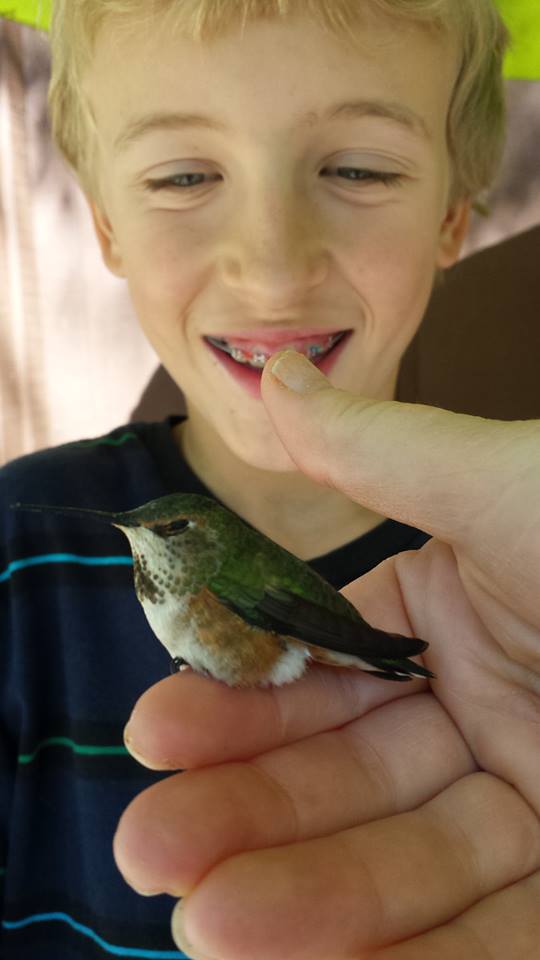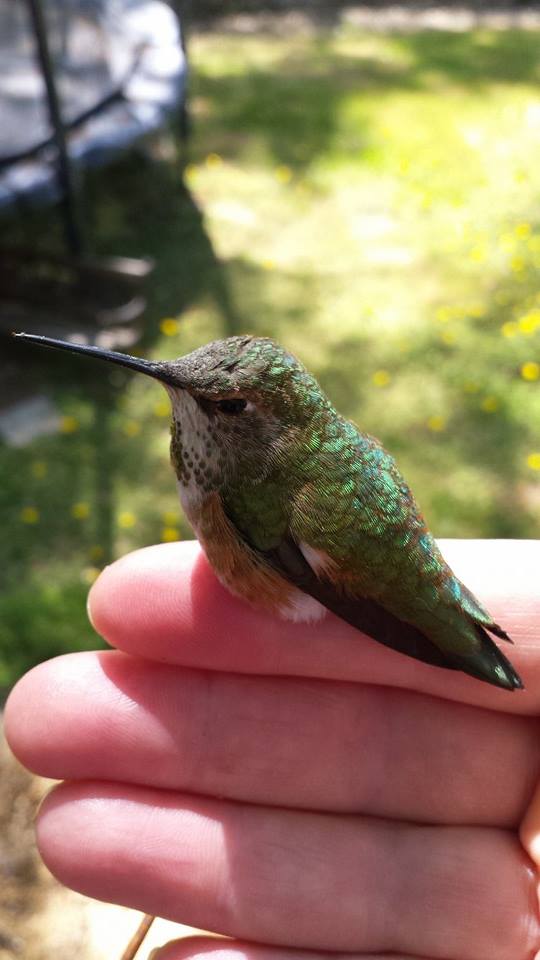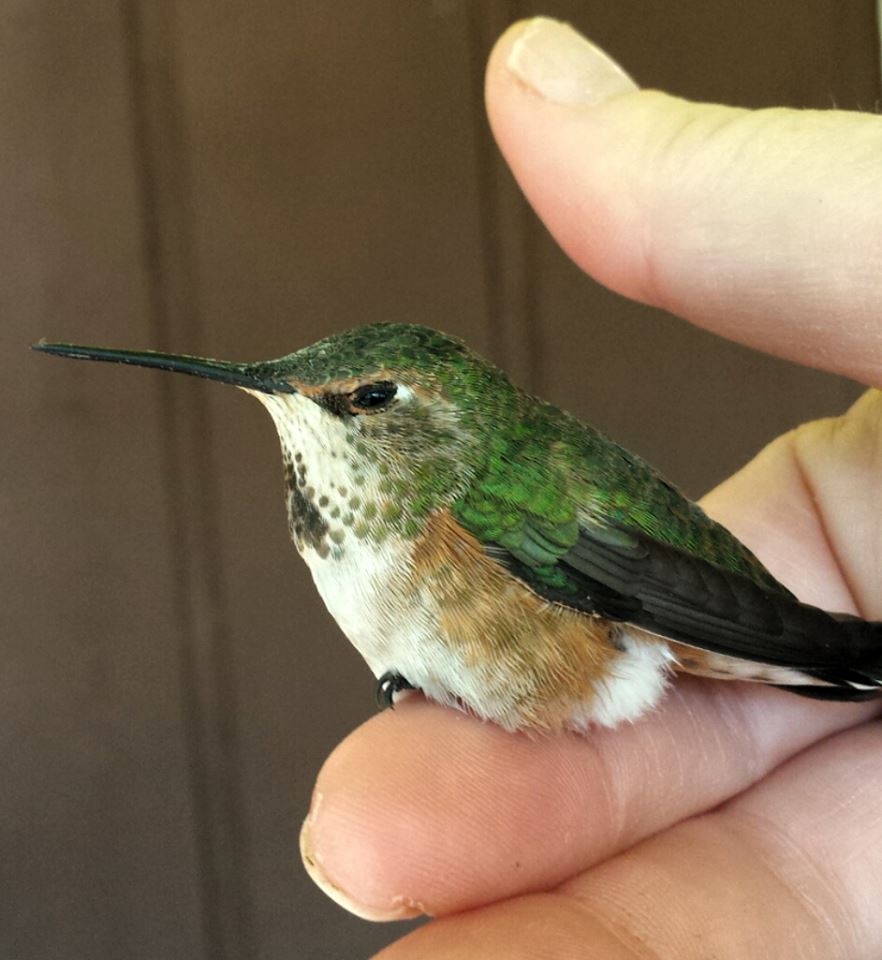When Carey Smith heard a tiny thump outside the window, she didn’t expect to see a little tiny living creature that probably weighed in at less than a penny. Carey was home with her school-age, animal-loving son, Brady.
“We looked out to find this little baby hummingbird upside down and breathing hard,” explains Smith. “We rushed out and Brady lifted his little body into the palm of his hand.”
For the next twenty minutes, they held the hummingbird carefully, keeping the weary traveler from becoming someone’s meal as he recovered.
“We watched him go from dazed and struggling to alert.”
Smith and her son were elated with the outcome of the day and the apparent good health of their unexpected visitor. What’s important is, they allowed the bird to recover on its own until it could safely take off, never standing in the way of Mother Nature.
“Brady was so full of joy, as was I, when the hummingbird flew away.”
 Smith credits Brady for the rescue, and says it’s not uncommon for him to help out this way.
Smith credits Brady for the rescue, and says it’s not uncommon for him to help out this way.
“The kiddo absolutely wants to save every critter he sees in distress!”
The hummingbird that briefly flew into the Smiths’ life, and window, had an accident that appeared to be unavoidable. It turns out that’s not the only problem baby birds can encounter. Before they’re even able to fly, they can fall out of their nests.
During the spring and summer wildlife refuges, parks, zoos, and veterinary clinics across the country are presented with a problem, according to the U.S. Fish and Wildlife Service (FWS).
“People out working in their yards, walking on trails, or visiting other outdoor sites find baby birds that cannot yet fly,” say the experts at FWS, referring not to a bird that flies into the window and is stunned, ala the Smiths, but to a bird that has simply fallen from home and can’t seem to get up.
It may seem that no adult birds are tending to the youngster, and people may immediately assume that the fledgling needs help.
“So they scoop up the bird, put it in a cardboard box, and bring it to the nearest facility they can think of to save the youngster,” FWS reports. Sadly, they say, this act of kindness probably does more harm than good.
 “The vast majority of baby birds brought in to these facilities are fledglings. This means that the babies have grown to the point at which they are just too big for their nest and need room to move around, flap their wings, and learn to fly.”
“The vast majority of baby birds brought in to these facilities are fledglings. This means that the babies have grown to the point at which they are just too big for their nest and need room to move around, flap their wings, and learn to fly.”
In addition, predators may be homing in on the nest site by now. If the babies leave the nest, they can avoid predators. The parent birds keep track of the babies using certain types of calls. When the baby responds, the adults bring food to the baby.
The old adage that you don’t touch a baby bird or the parents will smell your scent and not return may be completely false, say experts, but this tale has probably saved countless numbers of birds.
“We must trust the parents to raise the next generation; they have been doing this successfully for millions of years.”
If baby birds can hop and flutter about on their own, people are cautioned to leave them alone. Importantly, this principal applies to other animals including deer fawns, baby rabbits, raccoons and opossums.
Yet some birds found are truly nestlings, mostly featherless, and sometimes their eyes are not even yet open. They may have been blown from a nest, or the nest was destroyed. Without assistance, according to the FWS, these birds will probably die.
 The best advice is to place the baby back in the nest, if there is one. If you encounter nestlings, look for a nest within a few yards of where you found the bird. If you can safely replace the nestling, do so as soon as you can. If you are in a natural area, park, or refuge, it is probably best to leave everything alone.
The best advice is to place the baby back in the nest, if there is one. If you encounter nestlings, look for a nest within a few yards of where you found the bird. If you can safely replace the nestling, do so as soon as you can. If you are in a natural area, park, or refuge, it is probably best to leave everything alone.
The fact is, most birds are not 100 percent successful in raising a brood each year. Predators may raid nests before the eggs hatch or while babies are still helpless. Nests fail because of poor construction, or they placed it in an unprotected location.
Most parks, refuges, vets, and shelters are not set up to be full-time wildlife baby sitters. Rather, it takes very special people with special skills and proper permits to successfully raise infant wildlife to the point at which it can be released into the wild. It is illegal to keep wildlife in your possession.
These folks are licensed and dedicated to the wildlife. Most do it out of the goodness of their hearts on a shoestring budget and donations are gladly accepted.
Remember, the best thing you can do for the birds is to not interfere with Mother Nature; she will take care of them. Tell your children not to touch them, and if your children bring you a baby bird, help them bring it back to where they found it.
In the case of the Smiths, it seems like they handled their stunned little friend perfectly, as it flew off into the beautiful day. All’s well that ends well. Thanks for the amazing photos, Carey!



